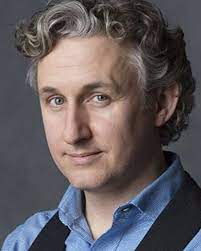
Michael Therriault
First time I saw Michael Therriault on stage was in the Canadian production of ‘The Producers’ as Leopold Bloom. He won a Dora for this performance.
While he was performing in a production of ‘Fiddler on the Roof’ in New York, Michael received word that he had been cast as Gollum in the Toronto premiere of ‘The Lord of the Rings: The Musical’ and he won a second Dora for his performance. Therriault also reprised his role in the West End production.
Therriault also portrayed Tommy Douglas in the Canadian Broadcasting Corporation’s (CBC) TV Special: ‘Prairie Grant: The Tommy Douglas Story’ for which he was nominated for a Gemini Award for Best Performance by an Actor in a Leading Role in a Dramatic Program or Mini-Series.
Michael attended Oakville’s Sheridan College and graduated with his degree in Music Theatre Performance. He was also a member of the inaugural Stratford Festival’s Birmingham Conservatory for Classical Theatre.
We conducted our conversation via email. Thank you, Merci, for the conversation, Michael:
It’s a harsh reality that the worldwide pandemic of Covid 19 has changed all of us. Describe how your understanding of the world you know and how your perception and experience have changed on a personal level.
I think I’ve learned that I am a bit more resilient than I had imagined. When Covid began, I was quite anxious about how life would be with this new virus. The idea of spending months this way, let alone a year, seemed terrifying. But we’ve all adapted to this strange way of living and I find that really surprising and strangely encouraging.
I also think, when things get back to normal, I will be even more aware of how precious time with friends and family is.
I think we all will be.
With live indoor theatre shut for one year plus, with it appearing it may not re-open any time soon, how has your understanding and perception as a professional artist of the live theatre industry been altered and changed?
I’ve been inspired by theatre’s resourcefulness and ability to adapt.
The Factory Theatre here in Toronto did some amazing live-streamed shows that still had the thrill of a one-time event that I hadn’t imagined possible on Zoom. The Old Vic in London has been doing similar things as well.
Both The Shaw and Stratford Festivals are planning outdoor experiences that sound exciting.
Also, it’s been fun seeing colleagues’ creativity expressing itself in new and surprising ways: A lighting designer has turned to photography; a sound designer is renovating boats for example.
As a professional artist, what are you missing the most about the live theatre industry?
I miss the community aspect: meeting every day to create together and be inspired by each other. I miss the thrill of first days, celebrating openings and closings as a company and the late night “aha!” moments you have when you are rehearsing.
As I read about the passing of colleagues during this time, I particularly miss our tradition of getting together in a theatre for a celebration of life and collectively thanking our passed colleague with a standing ovation. It’s a very moving gesture that always reminds me how fortunate I am to be a part of this community.
As a professional artist, what is the one thing you will never take for granted again in the live theatre industry when you return to it?
I think many of us will be even more aware of how special it is to being in a room full of people to share an experience together.
Describe one element you hope has changed concerning the live theatre industry.
This past year has had society investigate some big social issues that will no doubt have a positive impact on live theatre going forward.
I think our productions will become even more inclusive, diverse, and compassionate.
Explain what specifically you believe you must still accomplish within the industry.
I really just hope to keep learning.
As I’ve gotten older, I’ve found that some of the joy I had as a young actor can occasionally get shadowed by fear: fear of being bad, of getting it wrong, of being found out.
I’d like to continue to work to put joy and fearlessness in the forefront. I’ve always thought that the ‘it factor” that people talk about is really just people working joyfully.
Some artists are saying that audiences must be prepared for a tsunami of Covid themed stories in the return to live theatre. Would you elaborate on this statement both as an artist in the theatre and as an audience member observing the theatre.
When we gather again, we may feel the need to explore this experience we’re having in the stories we present on stage. That makes a lot of sense.
But I also think we will be relieved to explore other stories as well. The collective need to “move on” will be just as great.
As an artist, what specifically is it about your work that you want future audiences to remember about you?
I’d like to be thought of as inventive, creative, fearless (I’m working on that) but most important joyful. The work I’ve done that I am most proud of was filled with joy. It felt like flying.
And I think finding more joy in life is always a good idea.




